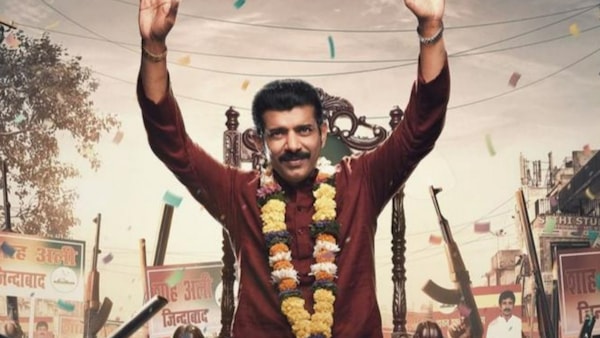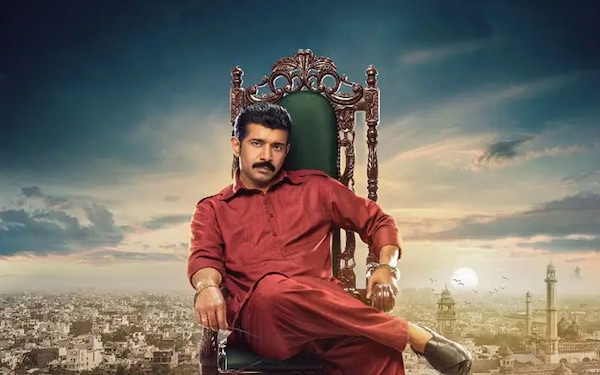Rangbaaz is Inspired by Mohammad Shahabuddin’s Bahubali Politics in Bihar

- Prathyush Parasuraman
Film Companion
Last Updated: 03.28 PM, Aug 02, 2022

Last year we had Maharani, a SonyLIV show starring Huma Qureshi, which attempted to look at the legacy of Lalu Prasad Yadav from an askance, sideways perspective, that of his wife Rabri Devi, who was made Chief Minister when her husband was flung behind bars. In the third season of Rangbaaz, the character of Lalu Prasad Yadav (Sudhanva Deshpande), though central in the public imagination, is pushed to the periphery, as it was in Maharani. Here, Yadav looks almost desperate and feckless, in a story that doesn’t have space for more than one hero. Our gaze is, instead, directed towards Haroun Shah Ali Beig (Vineet Kumar Singh), who is modelled on Mohammad Shahabuddin, one of Yadav’s close aides.
Beig is the Bahubali of Bihar, “Jo zameen ki raksha aur khauf ko kayam rakhe,” (the one who protects the land and inspires fear in people’s hearts). Like the first season of Rangbaaz (2018) that lovingly trailed Prakash Shukla (Saqib Saleem), a notorious gang leader from Gorakhpur, in Uttar Pradesh, and the second season, Rangbaaz Phirse (2019), which attempted to airbrush a Rajput gangster from Rajasthan, Anandpal Singh (Jimmy Shergill), once again we we have multiple timelines and a story of a friendship that sours in between politics and a reckless bullet barter.

Written by Siddharth Mishra, the show is directed by Sachin Pathak, who has been part of the Rangbaaz franchise since the beginning. This time, the silhouetted, savvy hand of Navdeep Singh (NH10, Manorama Six Feet Under, Laal Kaptaan) is at the helm. The expectation was a visually clean and gritty, thematically overpowering show, with a tensile sense of action and violence. What we get instead is a tepid political thriller that does not have the confidence to tell its story straight.
The timelines keep shifting. We are introduced to Haroun Shah Ali Beig in the 2010s, to then flip back to the 1980s when he was a child, 1990s when he began his political odyssey, and the 2000s where he doing a balancing act between conscience and power, with inroads into the present before meandering back into the past. This jumbled timescape is just to mask the show’s inability to tell a compelling story with an ironed out timeline. It’s a symptom of withering confidence in the storytellers’ own world building, but also a lack of trust that viewers will remember what they see. So, when a morally upright officer (Prashant Narayanan) arrests Beig, the latter reminds the former that this arrest means nothing, reminding the officer how, a decade ago, he had outsmarted the police force and escaped. Cue in: Flashback explaining that very moment, which took place in a haze of gunfire.
As the years drift in a whirlpool, Vineeth Kumar Singh’s eyes refuse to age or de-age. There is this weight, this puffed up, intense tiredness that is seen from his youth to his old age, even as the stable hairline which greys and the moustache deepens and darkens. He is such a measured performer, even his anger is reined in, the flare-up of the eyes, the twitching of the nose, rarely showing rage or desperation.
So when his anger erupts, like a pent up volcano, he bursts and acid is flung — literally. The fumes rising from atrophying skin is one of the most chilling images from this show, which stays away from high drama or moral melodrama because it cannot muster the craft for it. Haroun Shah Ali Beig is a protective father figure to his subjects — subjects is the word for this relationship, like every story of a hero, has a feudal quality — but he is also capable of immense violence, violence which the show treats as anesthetically as his victories. There are no rousing moments, no searing defeats, no moments of perplexed moral agony.
Dipesh Kumar (Soham Majumdar) plays Beig’s childhood friend, who becomes, through politics, his sworn enemy, the communist to Beig’s muscle raj (“Jo shaktishali hai, voh hamesha sahi hota hai.”). Communism here means he is always seen sloganeering, wearing gamchas, and burning through cigarettes, because the imaginations of showrunner Navdeep Singh and director Sachin Pathak refuses to complicate or take further the representation of communism on screen. There are throwaway references to the Naxals, but the show is too invested in its distance to want to make any point. Geetanjali Kulkarni plays Dipesh’s mother, stuck in permanent grief, hair whitened on her stiff wig because of which she cannot move her head freely, as though permanently balancing a book on her head, transforming even a seasoned actress into a bland splotch on the side, in a show that has no space for throbbing, reckless, pointed art or politics.
When integral court cases are decided, we find out through television news reports. When murders are inscribed into the moral fabric of this world, we are not invited into the quandary and instead are shown it from a distance. No rumbling of the stomach as a viewer. No quickening of the pulse. When elections are won, we are given celebratory processions. There is no build-up of either tension or stakes, as though the show thinks it isn’t necessary; as though the small-screen doesn’t deserve the slicked swagger of a theatrical film. That the story zig-zags is style statement enough. Even the final moment before the show draws its curtains has such a predictable texture to it, even an unsuspecting viewer could see through the scene as though through a clear pane.
While it is true that one does not necessarily need stakes or the traditions of dramatic storytelling to make a strong, compelling show — take movies like Gangs Of Wasseypur (2012) or shows like Guilty Minds — there is a reason playbooks for drama exist. It is for mediocre storytellers who do not have the vault of energy in their craft, the twisting gumption to shatter our worldviews with a thousand pinpricks instead of one sharp stab. I suppose then, that to know you are mediocre and to stick to a playbook, a style that has endured decades of mediocrity, is a virtue of its own.
Rangbaaz is available to stream on Zee5.
The post Rangbaaz is Inspired by Mohammad Shahabuddin’s Bahubali Politics in Bihar appeared first on Film Companion.

 Premium
Premium